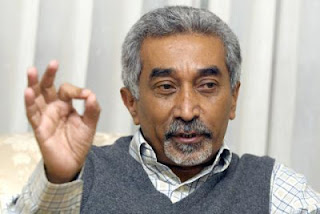 |
| Mari Alkatiri Image: Blogue da AICL |
"I don't know where this draft law came from. I know that it officially came from the Secretary of State for the Media, in very good Portuguese language. I don't know who wrote this law or which adviser wrote it, I don't know who they listened to because this law treats us like we are children, and that should not be done." Mr. Alkatiri who was a panellist on the 2nd day of the international seminar "Regulating the media, Building a Culture of Responsibility" held on Wednesday 21 March 2013.
Some articles of this draft media law prohibits political parties from having their own means of communication. Because of this Mari Alkatiri says that the constitution of the RDTL is very clear that political parties are the foundation of Timor-Leste's democracy, the organisation which is the democratic base of the country and therefore are entitled to have their own information organisations.
"We can establish communication media but we have to define their rules to limit publication, not just say it is not allowed, that is wrong," Mari Alkatiri affirmed.
Mari Alkatiri encouraged journalists not to fear politicians attempting to suppress the freedom of the press.
"There is no desire to limit freedom, but they must be responsibility," Alkatiri added.
The former Prime Minister and Secretary General of FRETILIN asked journalists to continue to learn so that they can publish information that is of quality and balanced.
Mari Alkatiri added that people become journalists because they are brave, they have strength, and strength must also be contained because they cannot abuse of that power.
"It is a form of corruption to abuse the power that we have," affirmed Mari Alkatiri.
Regarding the law on slanderous denunciation, Dr. Mari Alkatiri said that it was not done with the object of persecuting, but to educate.
"This law on slanderous denunciation was drafted by me not with the objective of persecuting anyone but to educate, because when the media has power they cannot abuse that power, because when it conflicts with the rights of others, then your rights are also diminished. Previously there was an article on defamation, but it is no longer a crime to deal with these things," explained Dr. Mari Alkatiri.
According to Mari Alkatiri, a press that does not exercise responsibility is destructive and is no longer a constructive force, a media that is constructive in denouncing corruption, exercises social control, educates and informs, a fundamental responsibility which is not a crime, and if not done is tantamount to complicity. Source: Jornal Nacional Diario 22/03/2013. Edited by Warren L. Wright
Related stories
Amnesty International says journalists at risk of imprisonment for exposing corruption
Penal Code provisions on defamation threaten democracy in Timor-Leste 2009 ETLJ 4 Defamation - a Crime or Not in Timor-Leste? A Legal Analysis on the East Timor Law Journal
Lao Hamutuk Statement on the Defamation Case against East Timor's Media
East Timor Press Freedom and Defamation in relation to the Applicable Law
Criminal Defamation in East Timor - A Miscarriage of Justice
Short Analysis of UNTAET Executive Order No 2 of 2002 on the Decriminalisation of Defamation
UNTAET Executive Order decriminalising defamation Press freedom under attack again as two journalists under house arrestAmnesty International says journalists at risk of imprisonment for exposing corruptionPenal Code provisions on defamation threaten democracy in Timor-Leste
Two journalists fined $150 for "slanderous denunciation"

No comments:
Post a Comment